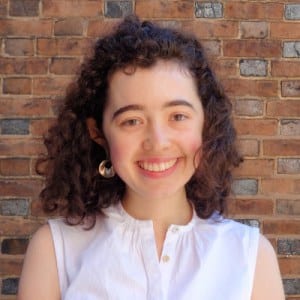
What is your area of study and what is the focus of your current research?
I am a third-year undergraduate majoring in philosophy but studying French and Spanish as well. I have yet to settle on a specific area in philosophy to delve into in my final year here at the University of Chicago—still dabbling in a little bit of this and that—but I have thoroughly enjoyed classes on bioethics, moral theory, the relationship between faith and reason, and ancient philosophy. That said, I am interested in reading more about the relationship between positive and negative liberty as a potential topic for my BA paper.
How did you first hear about Lumen Christi? Which event did you first attend, and why?
I first heard about Lumen Christi through family friends who attended the University of Chicago several years ago. When they heard that I would be coming here, they told me that Lumen Christi lectures were one of the many gem opportunities here that I should not miss. The first event I attended was a talk given by Fr. Edward Oakes titled, “The Second Vatican Council and the Church’s Engagement in the Modern World” because it was one of the first events of the year and because at the time I knew very little about the history and influences of Vatican II but was interested in learning more.
How has your participation in Institute lectures, conferences, and seminars contributed to your growth as a scholar?
The speakers at Lumen Christi events are role models of Catholic intellectuals whose knowledge of the faith gives me something to aspire to have in the future. When I leave a Lumen Christi event, be it a fascinating discussion of natural law with Professor Russell Hittinger or Fr. Raymond Gawronski’s lecture on “Saint John Paul II and the Polish Catholic Experience,” I find that I come away with an appreciation for a new array of concepts and thoughts, but at the same time a sense that I have only skimmed the surface of the particular topic at hand. It is then that I am reminded that part of learning is coming to see how little one does know, and that finding some ideas difficult to comprehend but interesting nonetheless is a strong reason to study further on one’s own.
Is there a particular event (or encounter with a scholar) that has directly impacted the development of your academic work?
Fr. Paul Mankowski’s, “The Catholic Tradition of Prayer and Devotion” last February resonated with me because Fr. Mankowski emphasized the necessity of a strong prayer life in order to be successful in whatever one’s task is, in this case, the work of being a student at the University of Chicago. He observed that sometimes people don’t adopt a regimen of prayer because they don’t think that using formulaic prayers suit them, but, noting that that is a mistaken assumption, emphasized that devotions can provide regularity to our prayer lives and help sustain them. This talk reminded me to invite God into an area of my life in which I had rarely asked for His inspiration, namely, my development as a student. Relying on God to let Him shape me into the scholar He needs gives me a great sense of peace.
What do you plan to do after you have completed your degree from the University of Chicago?
After I complete my undergraduate studies here, I think I would like to do some research and writing at a think tank specializing in something relating to bioethics or religion. Recently I have been considering pursuing graduate studies in religion and philosophy, though where I would go for that I have yet to decide. I think in the long term I would like to teach something in the area of religion at the college level.
Please comment on the role you think the Institute plays on the University of Chicago campus.
From an undergraduate perspective, I have noticed that Lumen Christi has created a strong sense of camaraderie among the undergraduates who attend the lectures and enjoy discussing the topics of the events long afterwards. Students who love discussing the finer points of the Catholic intellectual tradition can delve into them in great depth at Lumen Christi events and have the opportunity to speak to scholars one-on-one. By providing this forum for discussion, the Institute is very concretely building the Catholic presence in higher education. In addition, Lumen Christi showcases the ways in which Christian thinkers have made significant contributions to the secular disciplines of philosophy, literature, and art, among other fields. In providing a space for these conversations—be it those regarding the changing notions of love, the sacredness of the human person, or the history of sacred music—Lumen Christi events are occasions to continue thinking about the complexity and beauty of the faith.
